Books
The Way Home
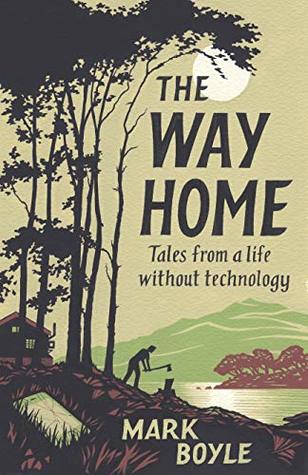
Mark Boyle’s previous experiment was to live without money for a year. He ended up living much longer than that, and it sent him down a path towards a new experiment: living without technology. The Way Home offers an intimate account of his life on a small farm in his native Ireland, where he chronicles his life without technology. Part Thoreau, part Gandhi, part Edward Abbey, this book is a wonderful journey that focuses not so much on the environmental destruction caused by modern culture, but on the effect that modern lifestyles have on us as people and on our relationship with the world. We know what is gained by technology, but what is lost?
If you like this book, you’ll also enjoy Mark Boyle’s 2011 TED talk about his relationship with money.
The Unlikely Peace at Cuchumaquic
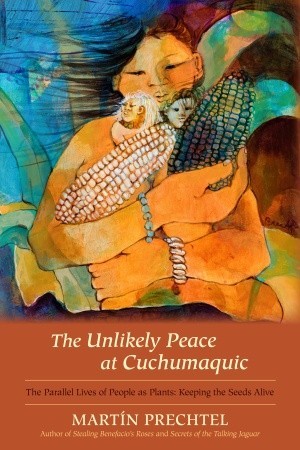
The Unlikely Peace at Cuchumaquic is like one of the seeds Martín Prechtel describes—preserving a way of thought so endangered in the modern world. From the perspective of those growing up in the Western worldview, we need a translator in order to go below the surface of indigenous thought. Prechtel is an excellent guide on that journey, and he asks that you follow him outside of what you might consider normal in order to see something more wondrous and complex. This book is part story, part elegy to a culture under siege, and part how-to guide to resist the homogenizing and dulling forces that consume indigenous and earth-based culture, all written in a long, flowing prose that sweeps you up and away into the story.
“Turn that worthless lawn into a beautiful garden of food whose seeds are stories sown, whose foods are living origins. Grow a garden on the flat roof of your apartment building, raise bees on the roof of your garage, grow onions in the iris bed, plant fruit and nut trees that bear, don’t plant ‘ornamentals’, and for God’s sake don’t complain about the ripe fruit staining your carpet and your driveway; rip out the carpet, trade food to someone who raises sheep for wool, learn to weave carpets that can be washed, tear out your driveway, plant the nine kinds of sacred berries of your ancestors, raise chickens and feed them from your garden, use your fruit in the grandest of ways, grow grapevines, make dolmas, wine, invite your fascist neighbors over to feast, get to know their ancestral grief that made them prefer a narrow mind, start gardening together, turn both your griefs into food; instead of converting them, convert their garage into a wine, root, honey, and cheese cellar–who knows, peace might break out, but if not you still have all that beautiful food to feed the rest and the sense of humor the Holy gave you to know you’re not worthless because you can feed both the people and the Holy with your two little able fists.”
The Wayfinders
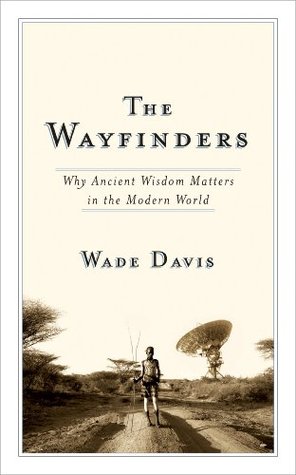
Wade Davis is an explorer of the human spirit and a champion for worldviews as an antidote to our present environmental decline. He takes us on a tour across the world, from the outstanding navigation of ancient Polynesians to the view of interconnectedness through the lens of Andean cultures. In seeking places for hope, for living alternatives to the consumerist and capitalist worldview, this is an excellent book to guide the first steps.
“If diversity is a source of wonder, its opposite – the ubiquitous condensation to some blandly amorphous and singularly generic modern culture that takes for granted an impoverished environment – is a source of dismay. There is, indeed, a fire burning over the earth, taking with it plants and animals, cultures, languages, ancient skills and visionary wisdom. Quelling this flame, and re-inventing the poetry of diversity is perhaps the most important challenge of our times.”
“The full measure of a culture embraces both the actions of a people and the quality of their aspirations, the nature of the metaphors that propel their lives. And no description of a people can be complete without reference to the character of their homeland, the ecological and geographical matrix in which they have determined to live out their destiny. Just as a landscape defines character, culture springs from a spirit of place.”
Open Veins of Latin America
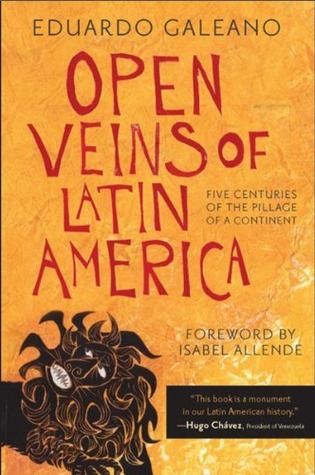
Open Veins of Latin America is a vivid exploration of colonial and neo-colonial history in all of Latin America. This book is a valid answer to the question, “how did the United States get so rich?” When we examine the origins of modern culture in the U.S., we rarely ask questions about where our consumer goods come from, who we stepped on to stand at the pinnacle of global power, or how Central Americans became refugees crossing our southern border. This book is about Latin American history, but it is also about the intentionally hidden histories of the United States.
“Our defeat was always implicit in the victory of others; our wealth has always generated our poverty by nourishing the prosperity of others – the empires and their native overseers. In the colonial and neocolonial alchemy, gold changes into scrap metal and food into poison.”
“Latin America is the region of open veins. Everything from the discovery until our times, has always been transmuted into European–or later–United States– capital, and as such has accumulated on distant centers of power. Everything: the soil, its fruits and its mineral-rich depths, the people and their capacity to work and to consume, natural resources and human resources.”
The More Beautiful World Our Hearts Know Is Possible
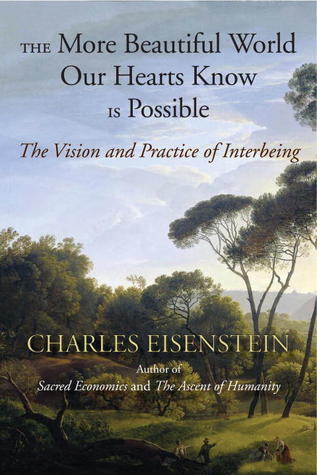
Read the book online for free here.
Charles Eisenstein tries beautifully to illuminate modern American culture for what it is: a ruthless game to maximize self-interest at the expense of those people, places, and parts of the natural world that are hidden to us or we choose to look away from. At the core is a proposition to create what he calls a “new story of the people”—a story to replace the story we tell ourselves about success and our purpose as a society.
Lies My Teacher Told Me
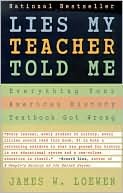
Why do we see our culture as exceptional? Why are we so reluctant to change even the most basic of our assumptions in the face of environmental catastrophe? James Loewen analyzes and compares the texts of the most popular 18 American history textbooks to ask whether this is really what we should be teaching our young people. The way we see our history is the way we see ourselves.
“Ironically, Adolf Hitler displayed more knowledge of how we treated Native Americans than American high schoolers today who rely on their textbooks. Hitler admired our concentration camps for American Indians in the west and according to John Toland, his biographer, “often praised to his inner circle the efficiency of America’s extermination—by starvation and uneven combat” as the model for his extermination of Jews and Gypsies (Rom people).”
“Consider a white ninth-grade student taking American history in a predominantly middle-class town in Vermont. Her father tapes Sheetrock, earning an income that in slow construction seasons leaves the family quite poor. Her mother helps out by driving a school bus part-time, in addition to taking care of her two younger siblings. The girl lives with her family in a small house, a winterized former summer cabin, while most of her classmates live in large suburban homes. How is this girl to understand her poverty? Since history textbooks present the American past as four hundred years of progress and portray our society as a land of opportunity in which folks get what they deserve and deserve what they get, the failures of working-class Americans to transcend their class origin inevitably get laid at their own doorsteps.”
The Protestant Ethic and the Spirit of Capitalism
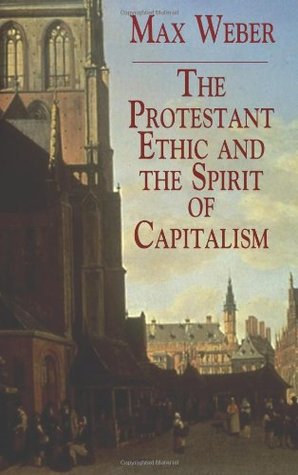
Max Weber was one of the original sociologists to see the disenchantment associated with the rise of capitalism. He pointed to the social and cultural roots of that phenomenon: a direct refute to Karl Marx’s ideas about class struggle and communism. When seeking the roots of the modern American culture and its associated damage to the natural world, Max Weber is an often overlooked stop on the path.
Wisdom Sits In Places
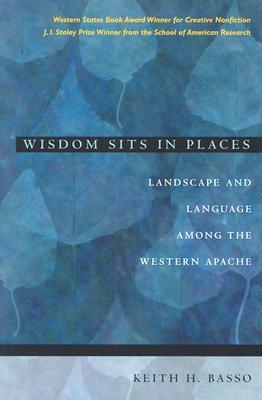
“one must acknowledge that local understandings of external realities are fashioned from local cultural materials, and that, knowing little or nothing of the latter, one’s ability to make appropriate sense of “what is” and “what occurs” in another’s environment is bound to be deficient.”
“You can’t live long without water and you can’t live a long time without wisdom. You need to drink both.”
Basso follows the relationship of four Apache people to the land where they live, illuminating what it means to be at home in a specific place in the world: the opposite of an extraction-based culture and economy.
Green Is The New Red
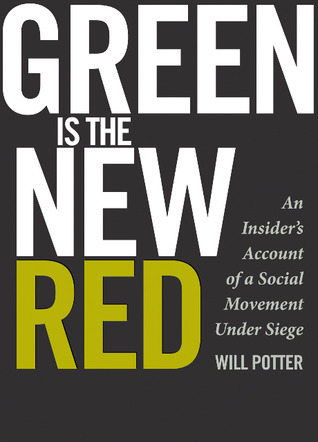
“At a time when it seems that everyone is going green, most people are unaware that the FBI is using anti-terrorism resources to target environmentalists and animal rights activists.”
Will Potter, an award-winning journalist, links corruption, corporate agendas, and the growing trend to label environmental activism as terrorism in post-9/11 America. His message is terrifying: large corporations have successfully lobbied to use anti-terrorism laws against environmentalists because activism harms their profits and can legally be defined as terrorism. This is the story of FBI agents infiltrating vegan potlucks and a story of citizens on watchlists for distributing pamphlets. Potters asks, who has the power in this country and how can ordinary citizens maintain their voice?
Small Is Beautiful: Economics As If People Mattered
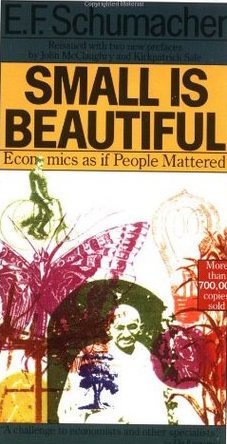
This classic asks a simple question: does our modern economy function in the interest of the average person? The obvious answer is that it does not. Schumacher outlines solutions and different ways of thinking about economics. This book is an antidote to the neoliberal economic policies of the world that have dominated since the time of Reagan and Thatcher, causing untold environmental and cultural destruction.
“Fossil fuels are merely a part of the “natural capital” which we steadfastly insist on treating as expendable, as if it were income, and by no means the most important part. If we squander our fossil fuels, we threaten civilisation; but if we squander the capital represented by living nature around us, we threaten life itself.”
Lifting Hearts Off The Ground
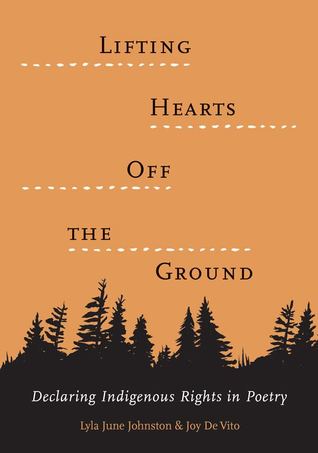
An indigenous poet and a settler poet examine the United Nations Declaration on the Rights of Indigenous Peoples and help it to become beautiful by bringing it into poetry.
Let My People Go Surfing
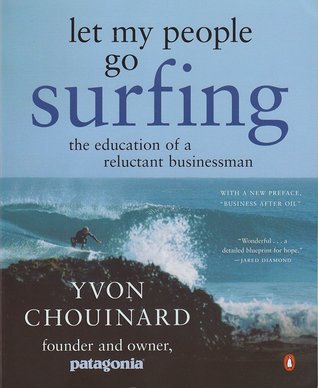
“The more you know, the less you need.”
“A master in the art of living draws no sharp distinction between his work and his play; his labor and his leisure; his mind and his body; his education and his recreation. He hardly knows which is which. He simply pursues his vision of excellence through whatever he is doing, and leaves others to determine whether he is working or playing. To himself, he always appears to be doing both.”
Yvon Chouinard is a legendary figure in the world of wilderness activities in the US. He invented a lot of modern rock climbing and mountaineering equipment, and funnels millions of dollars from his companies into environmental activism and protection. This is his book on business: how he went from being a climber forging carabiners in the back of his van in Yosemite Valley to founding the biggest companies producing equipment for the outdoors.
The One-Straw Revolution
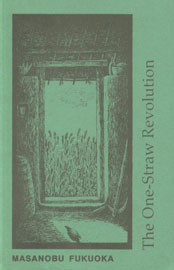
“Human beings are the only animals who have to work, and I think that is the most ridiculous thing in the world. Other animals make their livings by living, but people work like crazy, thinking that they have to in order to stay alive. The bigger the job, the greater the challenge, the more wonderful they think it is. It would be good to give up that way of thinking and live an easy, comfortable life with plenty of free time. I think that the way animals live in the tropics, stepping outside in the morning and evening to see if there is something to eat, and taking a long nap in the afternoon, must be a wonderful life. For human beings, a life of such simplicity would be possible if one worked to produce directly his daily necessities. In such a life, work is not work as people generally think of it, but simply doing what needs to be done.”
“When it is understood that one loses joy and happiness in the attempt to possess them, the essence of natural farming will be realized. The ultimate goal of farming is not the growing of crops, but the cultivation and perfection of human beings.”
Fukuoka is hailed across the world as a master in organic agriculture. His methods of “do-nothing farming” have inspired many, and his questions undermine all assumptions about what it takes to feed ourselves in the industrial age. Part Zen treatise, part memoir, part farming guide, this book is a classic, and a must-read for anybody who grows their own food (which should be everybody).
The Man Who Planted Trees
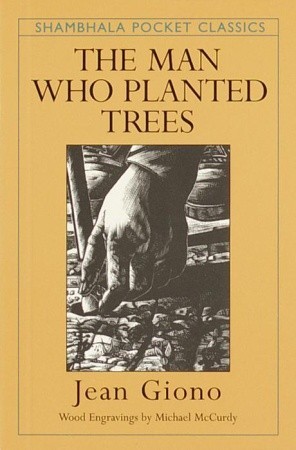
“The oaks of 1910 were then ten years old and taller than either of us. It was an impressive spectacle. I was literally speechless and, as he did not talk, we spent, the whole day walking in silence through his forest. In three sections, it measured eleven kilometers in length and three kilometers at its greatest width. When you remembered that all this had sprung from the hands and the soul of this one man, without technical resources, you understand that men could be as effectual as God in other realms than that of destruction.”
This gem is among our favorite stories: a simple allegory about the efforts of one man to change the world around him. It’s wonderfully written and just a fifteen minute read. This version, the story read aloud over an animated illustration, won an academy award for short films in 1987, and we highly recommend it. You can find Jeff’s transcription of this version here.
The Unsettling of America
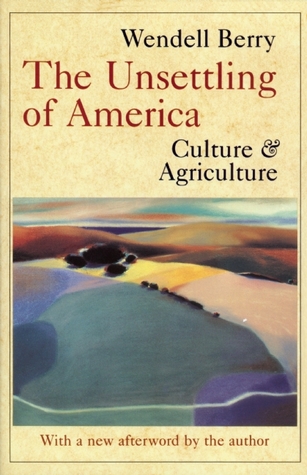
“We have given up the understanding — dropped it out of our language and so out of our thought — that we and our country create one another, depend on one another, are literally part of one another; that our land passes in and out of our bodies just as our bodies pass in and out of our land; that as we and our land are part of one another, so all who are living as neighbors here, human and plant and animal, are part of one another, and so cannot possibly flourish alone; that, therefore, our culture must be our response to our place, our culture and our place are images of each other and inseparable from each other, and so neither can be better than they other.”
Wendell Berry is a farmer and poet, outraged at what is happening with the spread of industrial agriculture. He details how our connection to the land is the definition of our culture, and how our industrial culture is killing both itself and the planet. If you read just one book about food, this should be it. Written over 50 years ago, Berry’s insight is still urgent and could have been written yesterday.
The Last American Man
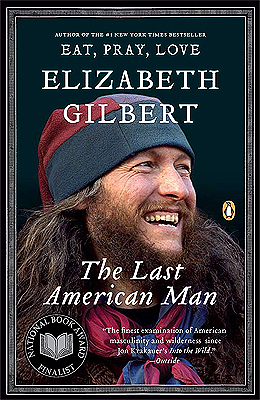
“Only those who live in the wilderness can recognize the central truth of existence, which is that death lives right beside us at all times, as close and as relevant as life itself, and that this reality is nothing to fear but is a sacred truth to be praised.”
“Show up for your own life, he said. Don’t pass your days in a stupor, content to swallow whatever watery ideas modern society may bottle-feed you through the media, satisfied to slumber through life in an instant-gratification sugar coma. The most extraordinary gift you’ve been given is your own humanity, which is about consciousness, so honor that consciousness.
Revere your senses; don’t degrade them with drugs, with depression, with willful oblivion. Try to notice something new everyday, Eustace said. Pay attention to even the most modest of daily details. Even if you’re not in the woods, be aware at all times. Notice what food tastes like; notice what the detergent aisle in the supermarket smells like and recognize what those hard chemical smells do to your senses; notice what bare feet fell like; pay attention every day to the vital insights that mindfulness can bring. And take care of all things, of every single thing there is – your body, your intellect, your spirit, your neighbors, and this planet. Don’t pollute your soul with apathy or spoil your health with junk food any more than you would deliberately contaminate a clean river with industrial sludge.”
Eaarth: Making Life on a Tough New Planet
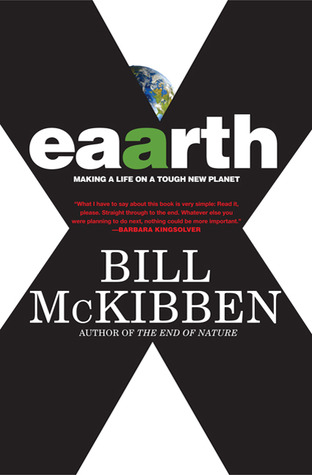
“Imagine we live on a planet. Not our cozy, taken-for-granted earth, but a planet, a real one, with dark poles and belching volcanoes and a heaving, corrosive sea, raked by winds, strafed by storms, scorched by heat. An inhospitable place. A different place. A different planet. It needs a new name: eaarth.”
McKibben paints a picture of what life will look like on an earth that’s undergoing the worst of climate change effects, a planet so altered from what we know now it might as well be a different planet: “Eaarth.” How will we repair our civilizations and protect ourselves from Eaarth—let alone drum up the money for such repairs and protections—when our economic system and its growth depend on the exhausted and degraded resources of a bygone Earth? McKibben argues for organizing in scaled-down decentralized communities (aka “Think Local”) that will be able to weather the storms we’ve made Eaarth throws at us. Eaarth’s solutions are focused more on how to cope with and mitigate the apocalypse than on averting it.
Mayordomo: Chronicle of an Acequia in Northern New Mexico
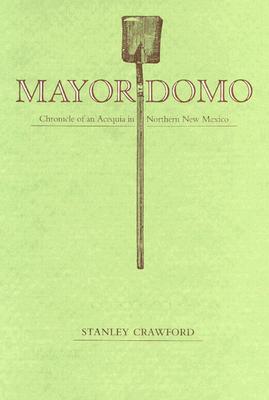
“No, by becoming mayordomo you do not become the Man, even if you are a gringo. You become something quite opposite. You become even more involved and entwined. Next to blood relationships, which rule the valley, come water relationships. The arteries of ditches and bloodlines cut across each other in patterns of astounding complexity…You can argue that the character of a man or woman can be as much formed by genetic and cultural material as by the location of their garden or chile patch along the length of a ditch, toward the beginning where water is plentiful or at the tail end where it will always be fitful and scarce.”
Crawford recounts his experiences in the role of a mayordomo, who is responsible for overseeing the maintenance and fair use of the acequia, a community-run canal/irrigation ditch that is the lifeline of his community’s agricultural livelihood in northern New Mexico. Crawford aims for depth, not breadth, documenting the slow, dry rhythms of farming life in a hispanic community managing their water by traditional Spanish law and how such management ties the community closer together.
Wilderness and the American Mind: Fifth Edition
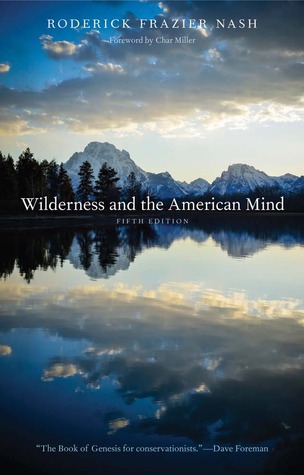
“Wilderness is a state of mind…not so much what wilderness is but what men think it is.”
Through history, politics, economics, and philosophy Nash captures (primarily white male city-dwelling) Americans’ relationship to nature in the United States of America since the country’s founding through the modern day. It traces the history of the environmental conservation/preservation movement and how we’ve come from fearing an overwhelming wilderness to now regarding it as a scarce national commodity and intellectual (and spiritual) concept. Though the perspective is narrowly focused and the writing sometimes academic to the point of dryness, it’s been described as “the Book of Genesis for conservationists” for a good reason: it’s possibly the best overview of American environmental history and represents a career’s worth of study, updated through five editions.
The Practice of the Wild
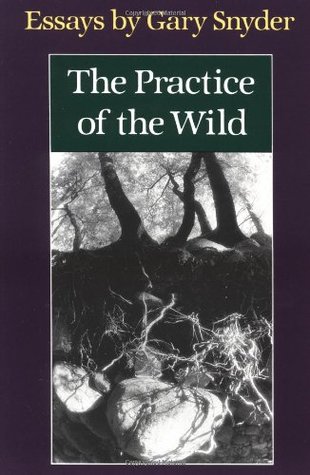
Read here
“I hope to investigate the meaning of wild and how it connects with free and what one would want to do with these meanings. To be truly free one must take on the basic conditions as they are—painful, impermanent, open, imperfect—and then be grateful for impermanence and the freedom it grants us. For in a fixed universe there would be no freedom. With that freedom we improve the campsite, teach children, oust tyrants. The world is nature, and in the long run inevitably wild, because the wild, as the process and essence of nature, is also an ordering of impermanence.”
“Nature is not a place to visit, it is home—and within that home territory there are more familiar and less familiar places. Often there are areas that are difficult and remote, but all are known and even named.”
In nine essays, the poet, environmentalist, and social critic Gary Snyder, described as “the laureate of Deep Ecology,” draws on his understanding of Zen Buddhist & Daoist teachings, Native American mythology, and his personal relationships to place as a logger and conservationist to interrogate what wildness really means how we can recognize and restore it in the world and in ourselves. But primarily, this is not a book about environmental activism; it is a book asking what it means to be human in a world that is rapidly changing. Where the wild used to mean home and source of life, it now means playground and escape.
A Sand County Almanac
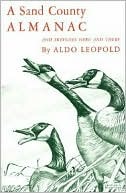
“Cease being intimidated by the argument that a right action is impossible because it does not yield maximum profits, or that a wrong action is to be condoned because it pays.”
“Conservation is getting nowhere because it is incomprehensible with our Abrahamic concept of land. We abuse land because we regard it as a commodity belonging to us. When we see land as a community to which we belong, we may begin to use it with love and respect. There is no other way for land to survive the impact of the mechanized man, nor for us to reap from it the esthetic harvest it is capable, under science, of contributing to culture. That land is a community is the basic concept of ecology, but that land is to be loved and respected is an extension of ethics. That land yields a cultural harvest is a fact long known, but latterly often forgotten…perhaps such a shift of values can be achieved by reappraising things unnatural, tame and confined in terms of things natural, wild, and free.”
In a series of essays in three parts, Leopold describes the “delights and dilemmas of one who cannot [live without wild things].” As a part-time farmer who works to make a home out of of an overexploited and abandoned farm in Sand County, Wisconsin, he is intimate with those delights and dilemmas. In part one, he sharply, lovingly observes the farm and its minute changes throughout the seasons: from the geese he admires to the partridge he hunts. In part two, he describes conservation issues affecting a variety of places scattered throughout North America. In part three, he expresses his grief at America’s current (at the time of writing) relationship with nature and what might be done to restore a healthy, compassionate relationship and land ethic. Throughout the book are lovely illustrations drawn by Charles W. Schultz.
The Abstract Wild
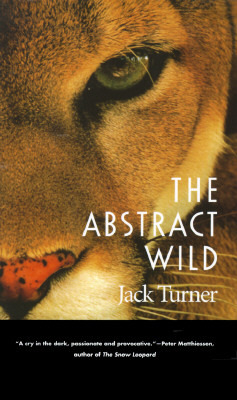
“Those early visits to the Maze, Glen Canyon, and the Escalante led me to the margins of the modern world, areas wild in the sense Thoreau meant when he said that in wildness is the preservation of the world: places where the land, the flora and fauna, the people, their culture, their language and arts were still ordered by energies and interests fundamentally their own, not by the homogenization and normalization of modern life.”
“[Wildness is] the relation of free, self-willed, and self-determinate ‘things’ with the harmonious order of the cosmos.”
“Something vast and old is vanishing and our rage should mirror that loss.”
In a collection of eight essays, Turner examines the questions: “how wild is wilderness and how wild are our experiences in it?” He argues—angrily, unapologetically—that the threats to wilderness have their root in six harmful abstract values and mindsets that shape our modern character and culture: 1) “our diminished personal experience of nature,” 2) “our preference for artifice,” 3) “our…dependence on experts to control and manipulate a natural world we no longer know,” 4) “our addiction to economics, recreation, and amusement at the expense of other values,” 5) a Western homogeneity and monoculture of biology, culture, language, thought, and social structures, and 6) an ignorance of or refusal to recognize the catastrophic loss of our “several-million-year-old intimacy with the natural world.” He calls for a change in character and in culture so we can reunited with the “life-force,” reborn as champions who confront the abstractions that keep the wild abstract from us.
Articles
Frances Moore Lappé changed how we eat. She wants to do the same for our democracy.
Frances Moore Lappé’s book, Diet For a Small Planet, is responsible for popularizing the concept that eating vegetarian is good for the world in ways beyond its impacts on animal welfare. Now, she’s encouraging us to think deeply again, and this time it’s broader and deeper than food.
Read the full article
Save Our Food. Free the Seed.
“The seeds in my palm optimized the farm for large-scale machinery and chemical regimens; they reduced the need for labor; they elbowed out the competition (formally known as biodiversity). In other words, seeds are a blueprint for how we eat.”
“According to a report published by the Organic Seed Alliance, most large-scale organic crop acreage is planted with conventional seed. Despite a recent uptick in the production of organic seed, there isn’t enough to go around. “Not if you want to plant 200 acres,” one midsize organic farmer told me. “Not even if you want to plant 50 acres.”
Farmers find themselves hobbled by weak plants that were designed to be weaned on chemicals.”
Read the full article
The Machine Stops
Oliver Sachs, the esteemed neurologist, right before his death, mediated on the affects of new technology and his fears and hopes for the future of our world.
“I have not adjusted as well as my aunt did to some aspects of the new—perhaps because the rate of social change associated with technological advances has been so rapid and so profound. I cannot get used to seeing myriads of people in the street peering into little boxes or holding them in front of their faces, walking blithely in the path of moving traffic, totally out of touch with their surroundings. I am most alarmed by such distraction and inattention when I see young parents staring at their cell phones and ignoring their own babies as they walk or wheel them along. Such children, unable to attract their parents’ attention, must feel neglected, and they will surely show the effects of this in the years to come.”
Read the full article
Corn Tastes Better On The Honor System
Robin Wall Kimmerer lays out the history of corn as an illustration of our relationship with the Earth and the way we live.
“My handful of Red Lake flint corn seeds were a gift from heritage seed savers, my friends at the Onondaga Nation farm, a few hills away. This variety is so old that it accompanied our Potawatomi people on the great migration from the East Coast to the Great Lakes. If you could carry only a single pouch of seeds, this would be the one to choose, with nutrition for physical health and teachings for spiritual health. Holding the seeds in the palm of my hand, I feel the memory of trust in the seed to care for the people, if we care for the seed. These kernels are a tangible link to history and identity and cultural continuity in the face of all the forces that sought to erase them. I sing to them before putting them into the soil and offer a prayer. The women who gave me these seeds make it a practice that every single seed in their care is touched by human hands. In harvesting, shelling, sorting, each one feels the tender regard of its partner, the human.
My neighbor bought his seeds from the distributor. They are a new GMO variety that he can’t save and replant but must buy every year. Unlike my seeds of many colors, his are uniform gold. They will be sown with the scent of diesel and the song of grinding gears. I suspect that those seeds have never been touched by a human, but only handled by machines. Nonetheless, when the seeds are in the ground and the gentle spring rain starts to fall, I suspect he looks up at the sky and prays. We both stand back and watch the miracle unfold.”
Listen to Robin Wall Kimmerer reading this article:
Read the full article
The World We Have
Engaged Buddhism’s main leader, Thich Nhat Hanh, discusses in this article the idea of combining Buddhist spirituality with environmental action.
“We need a kind of collective awakening. There are among us men and women who are awakened, but it’s not enough; the masses are still sleeping. They cannot hear the ringing of the bells. We have built a system we cannot control. This system imposes itself on us, and we have become its slaves and victims. Most of us, in order to have a house, a car, a refrigerator, a TV, and so on, must sacrifice our time and our lives in exchange. We are constantly under the pressure of time. In former times, we could afford three hours for one cup of tea, enjoying the company of our friends in a serene and spiritual atmosphere. We could organize a party to celebrate the blossoming of one orchid in our garden. But today we can no longer afford these things. We say that time is money. We have created a society in which the rich become richer and the poor become poorer, and in which we are so caught up in our own immediate problems that we cannot afford to be aware of what is going on with the rest of the human family or our planet Earth. In my mind I see a group of chickens in a cage disputing over some seeds of grain, unaware that in a few hours they will be killed.”
Read the full article
How Millennials Became The Burnout Generation
In this article, Anne Petersen talks about millennial burnout and how our society and culture is no longer working for us:
“All of this optimization — as children, in college, online — culminates in the dominant millennial condition, regardless of class or race or location: burnout. ‘Burnout’ was first recognized as a psychological diagnosis in 1974, applied by psychologist Herbert Freudenberger to cases of ‘physical or mental collapse caused by overwork or stress.’ Burnout is of a substantively different category than ‘exhaustion,’ although it’s related. Exhaustion means going to the point where you can’t go any further; burnout means reaching that point and pushing yourself to keep going, whether for days or weeks or years.
What’s worse, the feeling of accomplishment that follows an exhausting task — passing the final! Finishing the massive work project! — never comes. ‘The exhaustion experienced in burnout combines an intense yearning for this state of completion with the tormenting sense that it cannot be attained, that there is always some demand or anxiety or distraction which can’t be silenced,’ Josh Cohen, a psychoanalyst specializing in burnout, writes. ‘You feel burnout when you’ve exhausted all your internal resources, yet cannot free yourself of the nervous compulsion to go on regardless.'”
There’s a reason why an entire generation is feeling burnout: exhausted without any payout. It’s because they are burned-out from working nonstop, being on the clock at all hours, without any meaning or higher purpose. Our current culture and system are not working for us because it wasn’t designed with individuals or communities in mind. It wasn’t designed to make people content or happy or strive for higher values or meaning. It was designed to increase productivity, efficiency, and consumption, and on all of those metrics, it’s working. Just look at the millennials, who are working non-stop, to try to win at a broken system.
As Anne Petersen says, “We didn’t try to break the system, since that’s not how we’d been raised. We tried to win it.” Maybe it is time to stop trying to win at a broken system, and break the system instead, and then create a new system to replace it.
Read the full article
Science, Spirituality, and the Present World Crisis
“The world is now facing a series of crises: political, social, economic, ecological, and spiritual, which threatens the very existence of our civilization and perhaps of the species as well. On the one hand science has opened up enormous possibilities for a creative and happier life for all of humanity.
On the other hand, it has become evident that because of the general incoherence of society and the individual that I just described the further progress of science along its current lines cannot resolve these crises and may indeed tend to aggravate them. Thus for example it seems clear that science cannot make it possible for us to act together with the coherence and general good will needed to provide everyone with an adequate physical and social basis for life and at the same time to avoid destroying the planet through ecological disasters, climate changes, and so on. Nor can it help us deal with the forces of nationalism and religious divisions so these will no longer prevent us from getting together to meet all these problems which are evidently of a world-wide nature.
Clearly this sort of thing will be possible only if there is wide spread sharing of meaning allowing for the creation of a coherent culture which would eventually be planetary. How can a coherent culture come about? I want to suggest that the essential start is to be able to have a dialogue. This way people in different sub-cultures can come together to dialogue to share their meanings, perhaps to emerge with new meanings that would be common. We have to begin with people who are open enough to start the dialogue. We cannot begin with those who don’t want to. We need a place where people could get together merely to talk without trying to solve any problems. Simply to communicate, to share and to see if they could come to a common understanding.”
Read the full article
Keep The Consumer Dissatisfied
This article was originally published about 90 years ago at the beginning of the age of consumerism.
Not long ago one of the great bankers of the country said to me:
“The trouble with you fellows is that you are all the time changing automobiles and depreciating old cars, and you are doing it at a time when people have three or four payments to make on the cars they already have.
Yesterday I got an engraved invitation from one of your companies to see a new model. Out of curiosity I went. I darn near bought one. I didn’t because you people wouldn’t allow me enough money for my old car.”
A few weeks later I was again talking with this banker. He appeared to be greatly disgruntled.
“I bought the new model,” he barked. “But it was rotten shame that I had to accept so much depreciation on my old car. You are the fellow who is to blame. You, with all your changes and refinements, made me dissatisfied with the old model.”
He paused, then added, mournfully, “And that old car ran like new.”
I told him I thought it was worth what he paid—that is, the difference between the old and the new model—to have his mind changed.
He didn’t argue over that but he did say something to the general effect that “the only reason for research is to keep your customers reasonably dissatisfied with what they already have.”
I might observe, here and now, that he was right.
A few weeks back I was sitting with a group of executives. All were admiring a new model.
“It is absolutely the best automobile that can be made,” enthused one. I objected to that statement.
“Let’s take this automobile which, you say, is the ‘best that can be made’ and put it into a glass showcase,” I said. “Let’s put it in there—seal it so no person can possibly touch it. Just before we seal it in the case, let us mark the price in big letters inside the case.”
“Let us do that and come back here a year from today. After looking at it and appraising it, we will mark a price on the outside of the glass. It will be a price something less than what we think the car is worth today. Probably $200 less. Then, let’s come back once every year for ten years, look through the glass, and mark a new price. At the end of ten years we won’t be able to put down enough ciphers to indicate what we think of the car. That is, of course, eliminating its value as junk.
“In those ten years, no one could possibly have touched the car. There could be no lessened value through handling. The paint would be just as good as new; the crank case just as good; the real axle just as good; and the motor just as good as ever.
What then, has happened to the car?
“People’s minds will have been changed; improvements will come in other cars; new styles will have come. What you have here today, a car that you call ‘the best that can be made,’ will then be useless. So it isn’t the best that can be made. It may be the best you can have made and, if that is what you meant, I have no quarrel with what you said. . . .”
Change, to a research engineer, is improvement. People, though don’t seem to think of it in that manner. When a change is suggested they hold back and say, “What we have is all right—it does the work.” Doing the work is important but doing it better is more important. The human family in industry is always looking for a park bench where it can sit down and rest. But the only park benches I know of are right in front of an undertaker’s establishment.
There are no places where anyone can sit and rest in an industrial situation. It is a question of change, change, change, all the time—and it is always going to be that way. It must always be that way for the world only goes along one road, the road to progress. Nations and industries that have become satisfied with themselves and their ways of doing things, don’t last. While they are sitting back and admiring themselves other nations and other concerns have forgotten the looking-glasses and have been moving ahead . . . .
The younger generation—and by that I mean the generation that is always coming—knows what it wants and it will get what it wants. This is what makes for change. It brings about improvements in old things and developments in new things.
You can’t stop people from being born. You can’t stop the thing we call progress. You can’t stop the thing we call change. But you can get in tune with it. Change is never waste—it is improvement, all down the line. Because I have no further need for my automobile doesn’t mean that that automobile is destroyed. It goes to someone who has need for it and, to get it, he disposes of something that is unnecessary to his happiness. And so on to the end where the thing that is actually thrown away is of no further use to anyone. By this method living standards, all around, are raised.
We hear people complaining because of new models in automobiles. If it were not for these new models these same people would be paying more for what they have. Recognition of the fact that progress is inevitable forces us to recognize that we must have improvements in motor cars.
We, as manufacturers, must offer those improvements after they have been found to be capable improvements. The public buys and disposes of what it has. The fact that it is able to dispose of what it has enables us, as producers, to put a lower price tag on the new model. The law of economy in mass production enters here. We are permitted to turn out cars in volume because there is a market for them.
If automobile owners could not dispose of their cars to a lower buying strata they would have to wear out their cars with a consequent tremendous cutting in the yearly demand for automobiles, a certain increase in production costs, and the natural passing along of these costs to the buyer.
If everyone were satisfied, no one would buy the new thing because no one would want it. The ore wouldn’t be mined; timber wouldn’t be cut. Almost immediately hard times would be upon us.
You must accept this reasonable dissatisfaction with what you have and buy the new thing, or accept hard times. You can have your choice.
[From Charles F. Kettering, “Keep the Consumer Dissatisfied,” Nation’s Business, 17, no. 1 (January 1929), 30–31, 79.]
Have Smartphones Destroyed A Generation?
“There’s not a single exception. All screen activities are linked to less happiness, and all nonscreen activities are linked to more happiness. Eighth-graders who spend 10 or more hours a week on social media are 56 percent more likely to say they’re unhappy than those who devote less time to social media. Admittedly, 10 hours a week is a lot. But those who spend six to nine hours a week on social media are still 47 percent more likely to say they are unhappy than those who use social media even less. The opposite is true of in-person interactions. Those who spend an above-average amount of time with their friends in person are 20 percent less likely to say they’re unhappy than those who hang out for a below-average amount of time”
Read the full article
Your Stoke Won’t Save Us
“There’s also little to suggest that appreciative recreation will expand beyond its fixation on rock and ice. The highly biodiverse but somewhat uncharismatic Cascade-Siskiyou National Monument, facing similar threats of reduction from the Trump administration, has received a fraction of the attention from industry groups that the iconic, climbable, bikeable sandstone of Bears Ears has.”
Read the full article
The First White President
“To Trump, whiteness is neither notional nor symbolic but is the very core of his power. In this, Trump is not singular. But whereas his forebears carried whiteness like an ancestral talisman, Trump cracked the glowing amulet open, releasing its eldritch energies. The repercussions are striking: Trump is the first president to have served in no public capacity before ascending to his perch. But more telling, Trump is also the first president to have publicly affirmed that his daughter is a “piece of ass.” The mind seizes trying to imagine a black man extolling the virtues of sexual assault on tape (“When you’re a star, they let you do it”), fending off multiple accusations of such assaults, immersed in multiple lawsuits for allegedly fraudulent business dealings, exhorting his followers to violence, and then strolling into the White House. But that is the point of white supremacy—to ensure that that which all others achieve with maximal effort, white people (particularly white men) achieve with minimal qualification. Barack Obama delivered to black people the hoary message that if they work twice as hard as white people, anything is possible. But Trump’s counter is persuasive: Work half as hard as black people, and even more is possible.”
Listen to the audio version of this essay:
Read the full article
Films
The Moneyless Man
Mark Boyle is a well-spoken critic of the industrial capitalist system. Like a modern Henry David Thoreau, he set out to ask if it was possible to live outside of it. He offers valuable insight on the world of money in which we live. If you like this talk, you will love his 2019 book, The Way Home.
How Can We Eat Our Landscapes?
A story of transforming a small town by transforming the landscape that people live in.
Vandana Shiva on Sustainability
“Whatever I do, I do from a deep love… a very deep love for life and all its gifts and bounties. And it’s that love that replenishes me and recharges me to go on. I’m not doing a job for anybody. Nobody is paying me a salary—this much nine-to-five and a little bonus if you do more. No, this is about living. It is about the joy of living. And if that joy of living requires that those who are robbing the planet of its life, those who are robbing people of their lives have to be resisted and questioned, I will do that too. That too is part of my resistance.”
The Worldwide Web of Belief and Ritual
Teaching With the World Peace Game
How Movies Teach Manhood
Do Schools Kill Creativity?
This Country Isn’t Just Carbon Neutral—It’s Carbon Negative
As one of the happiest nations on Earth, Bhutan is leading the way in alternative thinking about our shared destiny as humans. What would it look like to have a country that prioritized happiness above all else and considered deeply future generations? Tshering Tobgay shares some of his vision.
The Shocking Move to Criminalize Nonviolent Protest
The author of Green is the New Red looks into the wealth and power behind environmental politics.
Dreams From Endangered Cultures
“Indigenous cultures are not failed attempts at modernity, let alone failed attempts to be us. They are unique expressions of the human imagination and heart, unique answers to a fundamental question: What does it mean to be human and alive? When asked this question, the peoples of the world respond in 7,000 different voices, and these collectively comprise our human repertoire for dealing with all the challenges that will confront us as a species over the coming centuries.”
The Danger of a Single Story
In the isolated United States, we are telling a single story not just about other cultures, but also about ourselves and what we should be working towards.
Plant Some Trees Right Where You Are
How can one person make a difference in the world? As a wise man told Por Phonamnuai, plant some trees right where you are. So he transformed his urban environment of Chiang Mai, Thailand by planting thousands of trees—fighting the growing urban heat bubble, creating a sense of civic engagement, and getting ordinary people to take ownership for the environment they live in.
Life is Easy—Why Do We Make It So Hard?
In great eloquence, our friend P’Jo (Jon Jondai) lays out his philosophy for life and his simple, undeniable refutation of the superiority of modern “culture.” The most important parts of life are easy when you have a group of friends and family doing them with you, and the Earth provides for us. Our modern lives seem crazy when compared to nature: a bird builds her nest in two days yet we work in uncomfortable, stressful jobs for 30 years to pay for ours. It might take a little longer than two days to build a house, but P’Jo offers solutions at Pun Pun Farm that are viable alternatives to the path we are on.
A Guerilla Gardener in South Central LA
Ron Finley—self-proclaimed food gangsta—seeks to transform food deserts and urban poverty through gardens in public places.
“Growing your own food is like printing your own money.”
Grief and Praise
Martín Prechtel shares his spiritual perspective on the interconnected web of problems facing the world today. This is part 1 of a 3-part talk—we trust you can find the rest on youtube.
The Shepherdess of the Glaciers
This film documents the life of a Ladakhi shepherdess who lives at 16,000 feet above sea level with 300 sheep and goats from her brother’s lens. Following her for multiple seasons, he guides the viewer through his sister’s daily life and the forces that threaten her livelihood—from the wolves and snow leopards of the mountains, to climate change’s ramifications on the region’s temperatures. Through images of the majestic Himalayan landscape, the familial connection between filmmaker and subject, and the intimate connection between a woman and her animals; this film works to restore awe in the natural world and the unbreakable connection between humans and their land.
The Man Who Planted Trees (1987)
The Man who Planted Trees is an award-winning animated short film based on a short story by the same title. In brief, the film tells the story of a shepherd—Elzéard Bouffier’s—attempt to re-forest an entire French valley alone, becoming acquainted with values of love, compassion and peace that the practice brings him through the years. Accompanied by whimsical illustrations and a touching storyline, this film highlights the tranquility and compassion that often get overshadowed in stories of modern-day environmentalism.
A Fierce Green Fire
This documentary guides viewers through the history of environmentalism through an empowering lens of collaboration, cooperation, and success in unlikely fights. Taking a look at the environmental movement’s connection to matters of water pollution, toxic waste, climate change, whaling, and damming—just to name a few—A Fierce Green Fire reminds us of the passion that comprises the foundation of the environmental movement.
I Am
After facing his own death, director Tom Shadyac launched himself into the world on a hunt to find what was wrong with it, but instead emerging with a sheer appreciation of the beauty and values within it: what was right. The documentary is an exploration of the power nestled in human-centered values such as love, compassion, simplicity, and connection.
The City Dark
For many, seeing a truly dark night sky is a humbling experience that is becoming rare in modern America. Filmmaker Ian Cheney asks “what do we lose, when we lose the dark?,” as he explores the relationship between humans, stars, artificial light and darkness throughout the United States. This documentary offers an in-depth look at the ramifications of artificial light and light pollution in our world.
Canyon Song
This short film introduces viewers to the Draper family, a Navajo family descending from participants of the “Long Walk”—a systematic forcing of Navajo people off their land by US military in 1864—as they stay connected to their ancestral lands of Canyon de Chelly National Monument. Two young girls, Tonisha and Tonielle Draper, live typical “American lives” on the surface, but are active in the reclamation of their Navajo heritage, reconnecting with ancestors, and showing deep reverence to the land within the canyon walls. Though an uplifting, hopeful film about connection, Canyon Song urges viewers to acknowledge the ability of natural spaces to serve as powerful reminders of history and culture—and necessitates their preservation through its implication of the preservation of an entire community’s tradition.
Holy (un)Holy River
Follow two filmmakers down India’s most sacred river—the Ganges, termed “Ma Ganga,” or “Mother Ganges” by many Hindus. Seen as a source of life, the river is a sacred body that flows 1,569 miles through the subcontinent. But it’s purity is threatened by increasing industrial emissions, damming, household trash, human remains, and sewage, all of which are exacerbated by unhindered population growth. “But if we worship it, how can we defile it?,” one woman in the film asks, calling attention to the contradiction of the world’s most holy river being threatened by the byproducts of a rapidly industrializing world. Holy (un)Holy River prompts the viewer question to question: how can a so-called ‘source of life’ put the lives of anyone bathing or drinking it at risk? Where can restoring the life of the Ganges begin?
180° South: Conquerors of the Useless
This documentary is the quintessential adventure classic. Splitting time between wild places and the developing world of South America, this film delves into the mindset of living for the journey, not the destination. Along the way, the hero explores sustainability in the developing world, collapse of past civilizations, and some of the largest and most innovative conservation efforts on the continent.





















